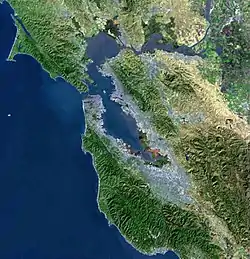Solano County, California
Solano County (/səˈlɑːnoʊ/ ⓘ) is a county located in the U.S. state of California. As of the 2020 census, its population was 453,491.[5] The county seat is Fairfield.[6]
Solano County | |
|---|---|
| Solano County | |
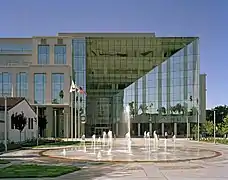 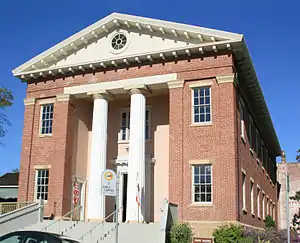  Images, from top down, left to right: The Solano County Government Center in Downtown Fairfield, Benicia Capitol State Historic Park, Suisun City Marina, Military C-5 Aircraft based at Travis Air Force Base, Vacaville Hills | |
 Flag  Seal | |
Interactive map of Solano County | |
 Location in the state of California | |
| Coordinates: 38.27°N 121.94°W | |
| Country | United States |
| State | California |
| Region | San Francisco Bay Area |
| Incorporated | February 18, 1850[1] |
| Named for | Chief Solano of the Suisun people |
| County seat | Fairfield |
| Largest city | Vallejo (population) Fairfield (area) |
| Government | |
| • Type | Council–Administrator |
| • Body |
|
| • Chair | John Vasquez |
| • Vice Chair | Monica Brown |
| • County Administrator[3] | William F. Emlen |
| Area | |
| • Total | 906 sq mi (2,350 km2) |
| • Land | 822 sq mi (2,130 km2) |
| • Water | 84 sq mi (220 km2) |
| Highest elevation | 2,822 ft (860 m) |
| Population (2020) | |
| • Total | 453,491 |
| • Density | 552/sq mi (213/km2) |
| Time zone | UTC−8 (Pacific Time Zone) |
| • Summer (DST) | UTC−7 (Pacific Daylight Time) |
| Area code | 707 |
| FIPS code | 06-095 |
| GNIS feature ID | 277312 |
| Congressional districts | 4th, 7th, 8th |
| Website | www |
Solano County comprises the Vallejo–Fairfield metropolitan statistical area, which is also included in the San Jose–San Francisco–Oakland, combined statistical area.[7] Solano County is the northeastern county in the nine-county San Francisco Bay Area region.
A portion of the South Campus at the University of California, Davis, is in Solano County.
History
.jpg.webp)
Solano County was one of the original counties of California, created in 1850 at the time of statehood.
At the request of General Mariano Guadalupe Vallejo, the county was named for Chief Solano of the Suisun people, a Native American tribe of the region and Vallejo's close ally. Chief Solano at one time led the tribes between the Petaluma River and the Sacramento River. The chief was also called Sem-Yeto, which signifies "brave or fierce hand." The chief was given the Spanish name Francisco Solano during baptism at the Catholic Mission, and is named after the Spanish Franciscan missionary, Father Francisco Solano. "Solano" is a common surname in the north of Spain, especially in Navarra, Zaragoza, and La Rioja.
Travis Air Force Base is located just east of Fairfield. Between 2017 and 2023, California Forever purchased over 50,000 acres of land in the county for an estimated $900 million to develop a new city.[8][9]
Region
Solano County is the easternmost county of the North Bay.[7] As such, it is sometimes reported by news agencies as being in the East Bay.[10][11][12] Additionally, a portion of the county extends into the Sacramento Valley, geographically.
Geography
According to the U.S. Census Bureau, the county has a total area of 906 square miles (2,350 km2), of which 84 square miles (220 km2), comprising 9.3%, are covered by water.[13]
Solano County had several cinnabar mines that were worked in the first half of the twentieth century, including the Hastings Mine and St. John's Mine.[14] Both of the mines, which are now inactive, are subject to ongoing mercury monitoring.
Flora and fauna
Solano County has a number of rare and endangered species, including the beetle Elaphrus viridis, the wildflower Lasthenia conjugens, commonly known as Contra Costa goldfields, and the annual plant Legenere limosa or false Venus' looking glass.
Adjacent counties
- Contra Costa County, California - south
- Sonoma County, California - west
- Napa County, California - west
- Yolo County, California - north
- Sacramento County, California - east
National protected area
Transportation
Major highways


Public transportation
Solano County is served by several transit agencies:
- SolTrans, formed as a merger between these two existing transit agencies:
- Vallejo Transit, which also formerly operated the Baylink Ferry to San Francisco
- Benicia Breeze
- San Francisco Bay Ferry, with a terminal in Vallejo
- Fairfield and Suisun Transit
- Vacaville City Coach
- Rio Vista Delta Breeze
Each agency interconnects with the others, enabling transit trips throughout the county. Service also connects with BART stations in Contra Costa County. Transit links are provided to Napa, Yolo and Sacramento counties as well.
Greyhound and Amtrak provide long-distance intercity service.
Airports
General aviation airports in Solano County that are open to the public are the Nut Tree Airport and Rio Vista Municipal Airport.
Demographics
| Census | Pop. | Note | %± |
|---|---|---|---|
| 1850 | 580 | — | |
| 1860 | 7,169 | 1,136.0% | |
| 1870 | 16,871 | 135.3% | |
| 1880 | 18,475 | 9.5% | |
| 1890 | 20,946 | 13.4% | |
| 1900 | 24,143 | 15.3% | |
| 1910 | 27,559 | 14.1% | |
| 1920 | 40,602 | 47.3% | |
| 1930 | 40,834 | 0.6% | |
| 1940 | 49,118 | 20.3% | |
| 1950 | 104,833 | 113.4% | |
| 1960 | 134,597 | 28.4% | |
| 1970 | 169,941 | 26.3% | |
| 1980 | 235,203 | 38.4% | |
| 1990 | 340,421 | 44.7% | |
| 2000 | 394,542 | 15.9% | |
| 2010 | 413,344 | 4.8% | |
| 2020 | 453,491 | 9.7% | |
| U.S. Decennial Census[15] 1790–1960[16] 1900–1990[17] 1990–2000[18] 2010[19] 2020[20] | |||
2020 census
| Race / Ethnicity | Pop 2010[19] | Pop 2020[20] | % 2010 | % 2020 |
|---|---|---|---|---|
| White alone (NH) | 168,628 | 155,125 | 40.80% | 34.21% |
| Black or African American alone (NH) | 58,743 | 60,051 | 14.21% | 13.24% |
| Native American or Alaska Native alone (NH) | 1,864 | 1,624 | 0.45% | 0.36% |
| Asian alone (NH) | 59,027 | 70,953 | 14.28% | 15.65% |
| Pacific Islander alone (NH) | 3,243 | 3,775 | 0.78% | 0.83% |
| Some Other Race alone (NH) | 1,463 | 2,988 | 0.35% | 0.66% |
| Mixed Race/Multi-Racial (NH) | 21,020 | 30,820 | 5.09% | 6.80% |
| Hispanic or Latino (any race) | 99,356 | 128,155 | 24.04% | 28.26% |
| Total | 413,344 | 453,491 | 100.00% | 100.00% |
Note: the US Census treats Hispanic/Latino as an ethnic category. This table excludes Latinos from the racial categories and assigns them to a separate category. Hispanics/Latinos can be of any race.
2014
A 2014 analysis by The Atlantic found Solano County to be the 5th most racially diverse county in the United States, behind Aleutians West Census Area and Aleutians East Borough in Alaska, Queens County in New York, and Alameda County in California.[21]
2011
| Population, race, and income | |||||
|---|---|---|---|---|---|
| Total population[22] | 411,620 | ||||
| White[22] | 214,436 | 52.1% | |||
| Black or African American[22] | 60,130 | 14.6% | |||
| American Indian or Alaska Native[22] | 2,427 | 0.6% | |||
| Asian[22] | 59,143 | 14.4% | |||
| Native Hawaiian or other Pacific Islander[22] | 3,390 | 0.8% | |||
| Some other race[22] | 43,064 | 10.5% | |||
| Two or more races[22] | 29,030 | 7.1% | |||
| Hispanic or Latino (of any race)[23] | 97,268 | 23.6% | |||
| Per capita income[24] | $29,367 | ||||
| Median household income[25] | $69,914 | ||||
| Median family income[26] | $79,316 | ||||
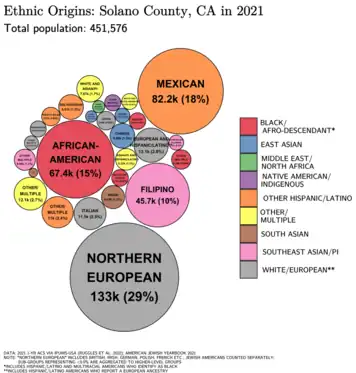
Places by population, race, and income
| Places by population and race | ||||||||
|---|---|---|---|---|---|---|---|---|
| Place | Type[27] | Population[22] | White[22] | Other[22] [note 1] |
Asian[22] | Black or African American[22] |
Native American[22] [note 2] |
Hispanic or Latino (of any race)[23] |
| Allendale | CDP | 1,968 | 86.1% | 10.7% | 3.2% | 0.0% | 0.0% | 14.7% |
| Benicia | City | 26,981 | 75.6% | 10.4% | 9.3% | 3.1% | 1.7% | 12.2% |
| Dixon | City | 18,141 | 74.9% | 17.0% | 3.8% | 3.0% | 1.3% | 39.4% |
| Elmira | CDP | 251 | 97.2% | 2.8% | 0.0% | 0.0% | 0.0% | 2.8% |
| Fairfield | City | 104,404 | 47.1% | 19.4% | 15.5% | 16.6% | 1.5% | 25.7% |
| Green Valley | CDP | 1,719 | 85.7% | 8.7% | 2.4% | 3.1% | 0.0% | 8.0% |
| Hartley | CDP | 2,229 | 85.3% | 4.4% | 1.7% | 7.3% | 1.3% | 12.7% |
| Rio Vista | City | 7,088 | 76.5% | 10.0% | 4.0% | 7.9% | 1.5% | 14.9% |
| Suisun City | City | 27,900 | 34.4% | 24.9% | 19.9% | 19.7% | 1.1% | 25.6% |
| Vacaville | City | 92,217 | 64.8% | 17.0% | 5.9% | 11.1% | 1.2% | 21.7% |
| Vallejo | City | 116,021 | 36.2% | 17.2% | 23.9% | 21.0% | 1.6% | 23.3% |
| Places by population and income | |||||
|---|---|---|---|---|---|
| Place | Type[27] | Population[28] | Per capita income[24] | Median household income[25] | Median family income[26] |
| Allendale | CDP | 1,968 | $41,928 | $112,837 | $119,063 |
| Benicia | City | 26,981 | $41,854 | $90,338 | $102,571 |
| Dixon | City | 18,141 | $27,624 | $72,626 | $76,038 |
| Elmira | CDP | 251 | $22,069 | $73,438 | $85,650 |
| Fairfield | City | 104,404 | $26,785 | $68,037 | $75,717 |
| Green Valley (Solano County) | CDP | 1,719 | $67,828 | $125,669 | $145,781 |
| Hartley | CDP | 2,229 | $41,041 | $87,841 | $106,786 |
| Rio Vista | City | 7,088 | $34,332 | $58,701 | $68,156 |
| Suisun City | City | 27,900 | $26,148 | $71,411 | $76,286 |
| Vacaville | City | 92,217 | $29,687 | $73,302 | $85,790 |
| Vallejo | City | 116,021 | $27,375 | $62,325 | $72,717 |
2010
The 2010 United States Census reported that Solano County had a population of 413,344. The racial makeup of Solano County was 210,751 (51.0%) White, 60,750 (14.7%) African American, 3,212 (0.8%) Native American, 60,473 (14.6%) Asian, 3,564 (0.9%) Pacific Islander, 43,236 (10.5%) from other races, and 31,358 (7.6%) from two or more races. Hispanic or Latino of any race were 99,356 persons (24.0%).[29] At 52,641 Filipinos in the county making up 12% of the population, Solano County has the largest percentage Filipino population of any county in the United States.
| Population racial makeup reported at 2010 United States Census | |||||||||
|---|---|---|---|---|---|---|---|---|---|
County | Total population | White | Asian | Two or more races | Hispanic or Latino (of any race) | ||||
| Solano County | 413,344 | 210,751 | 60,750 | 3,212 | 60,473 | 3,564 | 43,236 | 31,358 | 99,356 |
Total population | White | Asian | Two or more races | Hispanic or Latino (of any race) | |||||
| Benicia | 26,997 | 19,568 | 1,510 | 135 | 2,989 | 102 | 895 | 1,798 | 3,248 |
| Dixon | 18,351 | 13,023 | 562 | 184 | 671 | 58 | 2,838 | 1,015 | 7,426 |
| Fairfield | 105,321 | 48,407 | 16,586 | 869 | 15,700 | 1,149 | 13,301 | 9,309 | 28,789 |
| Rio Vista | 7,360 | 6,003 | 372 | 53 | 359 | 15 | 288 | 270 | 914 |
| Suisun City | 28,111 | 10,805 | 5,713 | 196 | 5,348 | 340 | 2,898 | 2,811 | 6,753 |
| Vacaville | 92,428 | 61,301 | 9,510 | 846 | 5,606 | 532 | 8,136 | 6,497 | 21,121 |
| Vallejo | 115,942 | 38,064 | 25,572 | 757 | 28,895 | 1,239 | 12,759 | 8,656 | 26,165 |
Total population | White | Asian | Two or more races | Hispanic or Latino (of any race) | |||||
| Allendale | 1,506 | 1,239 | 49 | 22 | 42 | 2 | 79 | 73 | 235 |
| Elmira | 188 | 150 | 1 | 10 | 2 | 0 | 17 | 8 | 47 |
| Green Valley | 1,625 | 1,412 | 41 | 6 | 82 | 9 | 20 | 55 | 121 |
| Hartley | 2,510 | 1,956 | 70 | 24 | 70 | 16 | 248 | 126 | 510 |
Other unincorporated areas | Total population | White | Asian | Two or more races | Hispanic or Latino (of any race) | ||||
| All others not CDPs (combined) | 13,005 | 8,823 | 764 | 110 | 709 | 102 | 1,757 | 740 | 4,027 |
2000
At the 2000 census there were 394,542 people, 130,403 households, and 97,411 families in the county. The population density was 476 inhabitants per square mile (184/km2). There were 134,513 housing units at an average density of 162 per square mile (63/km2). The racial makeup of the county was 56.4% White, 14.9% Black or African American, 0.8% Native American, 12.8% Asian, 0.8% Pacific Islander, 8.0% from other races, and 6.4% from two or more races. 17.64% of the population were Hispanic or Latino of any race. 8.5% were of German, 6.4% Irish and 6.0% English ancestry according to Census 2000. 75.7% spoke English, 12.1% Spanish and 6.6% Tagalog as their first language.[30] Of the 130,403 households 39.9% had children under the age of 18 living with them, 55.7% were married couples living together, 13.8% had a female householder with no husband present, and 25.3% were non-families. 19.6% of households were one person and 6.5% were one person aged 65 or older. The average household size was 2.90 and the average family size was 3.33.
The age distribution was 28.3% under the age of 18, 9.2% from 18 to 24, 31.3% from 25 to 44, 21.7% from 45 to 64, and 9.5% 65 or older. The median age was 34 years. For every 100 females there were 101.5 males. For every 100 females age 18 and over, there were 100.2 males.
The median household income was $54,099 and the median family income was $60,597. Males had a median income of $41,787 versus $31,916 for females. The per capita income for the county was $21,731. About 6.1% of families and 8.3% of the population were below the poverty line, including 10.3% of those under age 18 and 6.3% of those age 65 or over.
Crime
The following table includes the number of incidents reported and the rate per 1,000 persons for each type of offense (2011).
| Population and crime rates | ||
|---|---|---|
| Population[22] | 411,620 | |
| Violent crime[31] | 2,064 | 5.01 |
| Homicide[31] | 20 | 0.05 |
| Forcible rape[31] | 112 | 0.27 |
| Robbery[31] | 810 | 1.97 |
| Aggravated assault[31] | 1,122 | 2.73 |
| Property crime[31] | 8,460 | 20.55 |
| Burglary[31] | 4,168 | 10.13 |
| Larceny-theft[31][note 3] | 7,018 | 17.05 |
| Motor vehicle theft[31] | 2,084 | 5.06 |
| Arson[31] | 116 | 0.28 |
Cities by population and crime rates
| Cities by population and crime rates | ||||||||
|---|---|---|---|---|---|---|---|---|
| City | Population[32] | Violent crimes[32] | Violent crime rate per 1,000 persons |
Property crimes[32] | Property crime rate per 1,000 persons | |||
| Benicia | 27,459 | 37 | 1.35 | 390 | 14.20 | |||
| Dixon | 18,708 | 53 | 2.83 | 315 | 16.84 | |||
| Fairfield | 107,110 | 454 | 4.24 | 3,317 | 30.97 | |||
| Rio Vista | 7,485 | 39 | 5.21 | 145 | 19.37 | |||
| Suisun City | 28,593 | 57 | 1.99 | 558 | 19.52 | |||
| Vacaville | 93,951 | 246 | 2.62 | 2,031 | 21.62 | |||
| Vallejo | 117,912 | 878 | 7.45 | 5,844 | 49.56 | |||
Government and politics
Government
The Government of Solano County is defined and authorized under the California Constitution and law as a general law county. The County government provides countywide services such as elections and voter registration, law enforcement, jails, vital records, property records, tax collection, public health, and social services. In addition the County serves as the local government for all unincorporated areas.
The County government is composed of the elected five-member Board of Supervisors, several other elected offices including the Sheriff-Coroner, District Attorney, Assessor/Recorder, Auditor-Controller, and Treasurer/Tax Collector/County Clerk, and numerous county departments and entities under the supervision of the County Administrator. As of March 2023, the members of the Solano County Board of Supervisors were:
- Erin Hannigan, District 1
- Monica Brown, District 2, Vice Chair
- Wanda Williams, District 3
- John Vasquez, District 4, Chair
- Mitch Mashburn, District 5
Voter registration statistics
| Population and registered voters | ||
|---|---|---|
| Total population[22] | 411,620 | |
| Registered voters[33][note 4] | 210,453 | 51.1% |
| Democratic[33] | 102,177 | 48.6% |
| Republican[33] | 52,633 | 25.0% |
| Democratic–Republican spread[33] | +49,544 | +23.6% |
| Independent[33] | 5,940 | 2.8% |
| Green[33] | 878 | 0.4% |
| Libertarian[33] | 1,123 | 0.5% |
| Peace and Freedom[33] | 539 | 0.3% |
| Americans Elect[33] | 12 | 0.0% |
| Other[33] | 905 | 0.4% |
| No party preference[33] | 46,246 | 22.0% |
| Cities by population and voter registration | |||||||
|---|---|---|---|---|---|---|---|
| City | Population[22] | Registered voters[33] [note 4] |
Democratic[33] | Republican[33] | D–R spread[33] | Other[33] | No party preference[33] |
| Benicia | 26,981 | 68.1% | 47.2% | 25.3% | +21.9% | 8.4% | 22.1% |
| Dixon | 18,141 | 50.7% | 38.8% | 35.4% | +3.4% | 7.3% | 21.4% |
| Fairfield | 104,404 | 48.1% | 48.7% | 24.4% | +24.3% | 6.8% | 22.7% |
| Rio Vista | 7,088 | 72.6% | 42.7% | 33.9% | +8.8% | 9.0% | 18.2% |
| Suisun City | 27,900 | 49.1% | 52.4% | 20.2% | +32.2% | 7.0% | 23.2% |
| Vacaville | 92,217 | 50.1% | 39.6% | 33.2% | +6.4% | 8.5% | 22.1% |
| Vallejo | 116,021 | 48.8% | 59.9% | 14.5% | +45.4% | 6.1% | 21.8% |
Overview
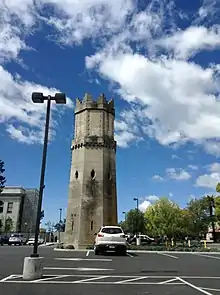
Solano County has been a Democratic stronghold in presidential and congressional elections, with Californians Richard Nixon (in 1972) and Ronald Reagan (in 1980 and 1984) being the only Republicans to win the county since 1928.
| Year | Republican | Democratic | Third party | |||
|---|---|---|---|---|---|---|
| No. | % | No. | % | No. | % | |
| 2020 | 69,306 | 33.51% | 131,639 | 63.65% | 5,886 | 2.85% |
| 2016 | 51,920 | 30.88% | 102,360 | 60.87% | 13,870 | 8.25% |
| 2012 | 52,092 | 34.08% | 96,783 | 63.32% | 3,965 | 2.59% |
| 2008 | 56,035 | 34.68% | 102,095 | 63.18% | 3,458 | 2.14% |
| 2004 | 62,301 | 41.86% | 85,096 | 57.17% | 1,440 | 0.97% |
| 2000 | 51,604 | 39.17% | 75,116 | 57.02% | 5,015 | 3.81% |
| 1996 | 40,742 | 34.74% | 64,644 | 55.12% | 11,893 | 10.14% |
| 1992 | 38,883 | 29.43% | 64,320 | 48.69% | 28,908 | 21.88% |
| 1988 | 50,314 | 47.43% | 54,344 | 51.23% | 1,430 | 1.35% |
| 1984 | 51,678 | 54.51% | 41,982 | 44.29% | 1,138 | 1.20% |
| 1980 | 40,919 | 50.72% | 30,952 | 38.37% | 8,805 | 10.91% |
| 1976 | 26,136 | 42.40% | 33,682 | 54.64% | 1,826 | 2.96% |
| 1972 | 31,314 | 54.02% | 24,766 | 42.73% | 1,885 | 3.25% |
| 1968 | 17,683 | 34.71% | 27,271 | 53.52% | 5,998 | 11.77% |
| 1964 | 15,263 | 30.38% | 34,930 | 69.53% | 47 | 0.09% |
| 1960 | 18,751 | 40.88% | 26,977 | 58.81% | 141 | 0.31% |
| 1956 | 17,865 | 41.68% | 24,903 | 58.10% | 95 | 0.22% |
| 1952 | 19,369 | 42.37% | 26,130 | 57.16% | 216 | 0.47% |
| 1948 | 12,345 | 33.71% | 23,257 | 63.50% | 1,022 | 2.79% |
| 1944 | 10,361 | 29.77% | 24,335 | 69.93% | 105 | 0.30% |
| 1940 | 6,081 | 28.51% | 15,054 | 70.58% | 193 | 0.90% |
| 1936 | 3,603 | 20.89% | 13,459 | 78.05% | 182 | 1.06% |
| 1932 | 4,382 | 30.30% | 9,712 | 67.16% | 367 | 2.54% |
| 1928 | 7,061 | 52.32% | 6,278 | 46.51% | 158 | 1.17% |
| 1924 | 4,782 | 48.00% | 957 | 9.61% | 4,223 | 42.39% |
| 1920 | 7,102 | 64.77% | 2,954 | 26.94% | 909 | 8.29% |
| 1916 | 3,536 | 36.35% | 5,678 | 58.37% | 514 | 5.28% |
| 1912 | 40 | 0.50% | 3,650 | 45.66% | 4,303 | 53.83% |
| 1908 | 3,115 | 54.72% | 2,033 | 35.71% | 545 | 9.57% |
| 1904 | 3,176 | 61.37% | 1,555 | 30.05% | 444 | 8.58% |
| 1900 | 3,114 | 55.36% | 2,262 | 40.21% | 249 | 4.43% |
| 1896 | 2,702 | 53.19% | 2,284 | 44.96% | 94 | 1.85% |
| 1892 | 2,403 | 49.21% | 2,174 | 44.52% | 306 | 6.27% |
| 1888 | 2,231 | 49.67% | 2,158 | 48.04% | 103 | 2.29% |
| 1884 | 2,382 | 53.61% | 1,977 | 44.50% | 84 | 1.89% |
| 1880 | 1,963 | 49.80% | 1,959 | 49.70% | 20 | 0.51% |
Solano County is split between California's 4th, 7th and 8th congressional districts, represented by Mike Thompson (D–St. Helena), Doris Matsui (D–Sacramento) and John Garamendi (D–Walnut Grove) respectively.[35]
In the California State Assembly, Solano County is split between the 4th Assembly District, represented by Democrat Cecilia Aguiar-Curry, and the 11th Assembly District, represented by Democrat Lori Wilson. In the California State Senate, it is in the 3rd Senate District, represented by Democrat Bill Dodd.[36]
On November 4, 2008, Solano County voted 55.82% in favor of Proposition 8, which amended the California Constitution to ban same-sex marriages. It was the only Bay Area county to approve the initiative.[37] In the 2008 presidential election that day, Barack Obama carried the county by a 28.5% margin over John McCain, a larger margin than statewide (24%).[38]
According to the California Secretary of State, as of February 10, 2019, Solano County has 236,028 registered voters. Of those, 106,452 (45.1%) are registered Democrats, 50,006 (21.2%) are registered Republicans, and 66,558 (28.2%) have declined to state a political party.[39] Democrats hold voter-registration advantages in all incorporated cities and towns in Solano County. However, Republicans lead in registration in the unincorporated communities of the county (40%-35%), making Solano the only county in the Bay Area where Republicans out-number Democrats in unincorporated communities. The Democrats' largest registration advantage in Solano is in the city of Vallejo, wherein there are only 8,242 Republicans (14.6%) out of 56,313 total voters compared to 33,753 Democrats (59.9%) and 12,157 voters who have declined to state a political party (21.6%).
Communities
Cities
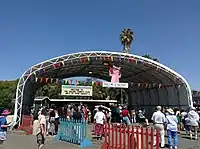 People line up at the gate to the Solano County Fair in Vallejo, California
People line up at the gate to the Solano County Fair in Vallejo, California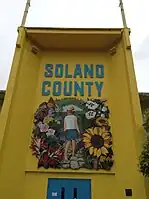 A building on the Solano County Fairgrounds
A building on the Solano County Fairgrounds
Census-designated places
Other unincorporated communities
Population ranking
The population ranking of the following table is based on the 2020 census of Solano County.[40]
† county seat
| Rank | Settlement | Municipal type | Population (2020 census) |
|---|---|---|---|
| 1 | Vallejo | City | 126,090 |
| 2 | † Fairfield | City | 119,881 |
| 3 | Vacaville | City | 102,386 |
| 4 | Suisun City | City | 29,518 |
| 5 | Benicia | City | 27,131 |
| 6 | Dixon | City | 18,988 |
| 7 | Rio Vista | City | 10,005 |
| 8 | Hartley | CDP | 2,430 |
| 9 | Green Valley | CDP | 1,654 |
| 10 | Allendale | CDP | 1,651 |
| 11 | Elmira | CDP | 193 |
Miscellania
- In 1985 Humphrey the humpback whale strayed off his migration route and ended up in Shag Slough north of Rio Vista. Rescuers from the Marine Mammal Center and other volunteers dismantled a county bridge before being able to turn him around in the narrow slough.
See also
Explanatory notes
- Other = Some other race + Two or more races
- Native American = Native Hawaiian or other Pacific Islander + American Indian or Alaska Native
- Only larceny-theft cases involving property over $400 in value are reported as property crimes.
- Percentage of registered voters with respect to total population. Percentages of party members with respect to registered voters follow.
- This total comprised 3,353 votes for Progressive Theodore Roosevelt (who was official Republican nominee in California), 781 votes for Socialist Eugene V. Debs and 169 votes for Prohibition Party nominee Eugene W. Chafin.
References
- "Chronology". California State Association of Counties. Archived from the original on January 29, 2016. Retrieved February 6, 2015.
- "Solano County - Board Members".
- "Solano County - County Administrator".
- "Mount Vaca". Peakbagger.com. Retrieved April 8, 2015.
- "Solano County, California". United States Census Bureau. Retrieved January 30, 2022.
- "Find a County". National Association of Counties. Retrieved June 7, 2011.
- Landis, John D.; Reilly, Michael (2003). "How We Will Grow: Baseline Projections of California's Urban Footprint Through the Year 2011". In Guhathakurta, Subhrajit (ed.). Integrated Land Use and Environmental Models: A Survey of Current Applications and Research. Springer. p. 84. ISBN 9783540005766. Retrieved March 14, 2012.
- "The Botched Reveal of California Forever". The Information. Retrieved September 24, 2023.
- Dougherty, Conor; Griffith, Erin (August 25, 2023). "The Silicon Valley Elite Who Want to Build a City From Scratch". The New York Times. ISSN 0362-4331. Retrieved September 24, 2023.
- Alston, John (April 18, 2008). "Solano County's unemployment rate soars to 6.4 percent". abc7news.com. Archived from the original on August 1, 2013. Retrieved March 14, 2012.
- Walters, Dan (March 29, 1986). "East Bay is a Socioeconomic Dichotomy". Lodi News-Sentinel. p. 12. Retrieved March 14, 2012.
- "Bay Area median home price falls below $500,000". San Francisco Business Times. July 17, 2008. Retrieved March 14, 2012.
- "US Gazetteer files: 2010, 2000, and 1990". United States Census Bureau. February 12, 2011. Retrieved April 23, 2011.
- Hogan, C. Michael; Papineau, Marc (September 1989). "Environmental Assessment of the Columbus Parkway Widening between Ascot Parkway and the Northgate Development, Vallejo". Earth Metrics Inc. Report 7853. California State Clearinghouse.
- "Census of Population and Housing from 1790-2000". US Census Bureau. Retrieved January 24, 2022.
- "Historical Census Browser". University of Virginia Library. Retrieved May 31, 2014.
- "Population of Counties by Decennial Census: 1900 to 1990". United States Census Bureau. Retrieved May 31, 2014.
- "Census 2000 PHC-T-4. Ranking Tables for Counties: 1990 and 2000" (PDF). United States Census Bureau. Retrieved May 31, 2014.
- "P2 HISPANIC OR LATINO, AND NOT HISPANIC OR LATINO BY RACE - 2010: DEC Redistricting Data (PL 94-171) - Solano County, California". United States Census Bureau.
- "P2 HISPANIC OR LATINO, AND NOT HISPANIC OR LATINO BY RACE - 2020: DEC Redistricting Data (PL 94-171) - Solano County, California". United States Census Bureau.
- Narula, Svati Kirsten (April 29, 2014). "The 5 U.S. Counties Where Racial Diversity Is Highest—and Lowest". The Atlantic. Retrieved May 8, 2017.
- U.S. Census Bureau. American Community Survey, 2011 American Community Survey 5-Year Estimates, Table B02001. U.S. Census website. Retrieved 2013-10-26.
- U.S. Census Bureau. American Community Survey, 2011 American Community Survey 5-Year Estimates, Table B03003. U.S. Census website. Retrieved 2013-10-26.
- U.S. Census Bureau. American Community Survey, 2011 American Community Survey 5-Year Estimates, Table B19301. U.S. Census website. Retrieved 2013-10-21.
- U.S. Census Bureau. American Community Survey, 2011 American Community Survey 5-Year Estimates, Table B19013. U.S. Census website. Retrieved 2013-10-21.
- U.S. Census Bureau. American Community Survey, 2011 American Community Survey 5-Year Estimates, Table B19113. U.S. Census website. Retrieved 2013-10-21.
- U.S. Census Bureau. American Community Survey, 2011 American Community Survey 5-Year Estimates. U.S. Census website. Retrieved 2013-10-21.
- U.S. Census Bureau. American Community Survey, 2011 American Community Survey 5-Year Estimates, Table B01003. U.S. Census website. Retrieved 2013-10-21.
- "2010 Census P.L. 94-171 Summary File Data". United States Census Bureau.
- "U.S. Census website". United States Census Bureau. Retrieved May 14, 2011.
- Office of the Attorney General, Department of Justice, State of California. Table 11: Crimes – 2009 Archived 2013-12-02 at the Wayback Machine. Retrieved 2013-11-14.
- United States Department of Justice, Federal Bureau of Investigation. Crime in the United States, 2012, Table 8 (California). Retrieved 2013-11-14.
- California Secretary of State. February 10, 2013 - Report of Registration Archived July 27, 2013, at the Wayback Machine. Retrieved 2013-10-31.
- Leip, David. "Dave Leip's Atlas of U.S. Presidential Elections". uselectionatlas.org. Retrieved September 5, 2018.
- "California's 3rd Congressional District - Representatives & District Map". Civic Impulse, LLC. Retrieved March 1, 2013.
- "Statewide Database". UC Regents. Archived from the original on February 1, 2015. Retrieved December 4, 2014.
- "Supplement to the Statement of Vote Statewide Summary by County for State Ballot Measures" (PDF). California Secretary of State. p. 52. Retrieved July 1, 2019.
- Leip, David. "Dave Leip's Atlas of U.S. Presidential Elections". www.uselectionatlas.org. Retrieved October 2, 2016.
- CA Secretary of State – Report of Registration – February 10, 2019 Archived March 23, 2019, at the Wayback Machine
- "Explore Census Data". United States Census Bureau. Retrieved November 28, 2021.
External links
- Official website
- Munro-Fraser, J. P. (1879). History of Solano County. San Francisco, California: Wood, Alley & Co. An early history of Solano County.
- Hiking trails in Solano County
